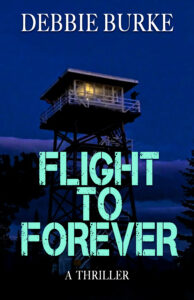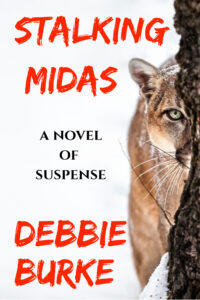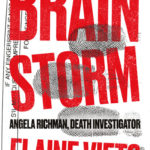By Debbie Burke
Happy 2021 and welcome back to TKZ after the annual holiday break!
Today, we kick off the new year with the first page of Rene Out on a Limb, a humorous middle-grade mystery. Please enjoy this submission then we’ll discuss it:
Rene Out on a Limb – First 400 words
The branch of the tree makes a creaky noise when I wriggle out on it, and the ground looks really far away. I’m not worried, though. Oak tree limbs don’t break … do they?
“Psst.” My cousin Joanie tries to whisper, but it sounds more like a moose wheezing. Joanie is nine years old, but she never learned how to whisper properly. She’s sitting on a low branch like she’s glued to the trunk. A squirrel pokes its head out of a knothole and gnaws on an acorn while he stares at me. Like he’s surprised to see a girl halfway out on a limb. But this is my life. An investigative reporter knows no fear.
“Psst. Rene, stop.” Joanie’s voice gets a little louder and scaredier as I inch my way along the branch.
“Shh.” I whisper back with much better form. “I want to hear what they’re saying.” It’s good practice for a reporter to eavesdrop on possible subjects, and I’d radared in on Nate Peterson as he walked across campus with his girlfriend. They were so wrapped up in each other, they didn’t even see us. They stopped next to that big elm tree a few feet away, and the girl stood with her back against the trunk while he leaned toward her with his hand on the tree and a goofy expression on his face.
I’ll never understand adults. If Nate’s trying to impress his girlfriend, he’d do better if he stood on his head or did a couple of cartwheels. At least it would show a little talent. Maybe he could buy a yo-yo.
I creep another couple of inches forward, ease the notebook out of my pocket, and strain to hear. He calls the girl “Cassie.” I write it down.
Cassie was saying something about Reverend Newton. I know him. He’s the minister at the university chapel. She says, “He asked me to stop by today after lunch. It’s about Mr. Myet.”
Mr. Myet? Wasn’t he the librarian who died in that fire?
Cassie frowns. “Reverend Newton thinks there may have been foul play.”
Murder! My heart pounds and my ears become antennae. Maybe I can solve the mystery and expose the killer. I could be famous. I’ll be the youngest person who ever won a Pulitzer Prize!
I try to ease forward, but my foot gets caught.
~~~
This story blasts right out of the gate. In three short paragraphs, the author introduces Rene, the first-person protagonist, establishes her approximate age, and introduces her goal—she wants to be a famous investigative reporter.
By the ninth paragraph, she presents the mysterious death of the librarian, Mr. Myet. Rene’s mission grows more ambitious with that revelation. She’s determined to solve the crime.
The Brave Author includes another important detail: Rene is already in danger because the tree limb she’s clinging to could break. If that happens (and I’m fairly sure it will in the next page or two), Rene might be injured. But a more serious consequence: she will be discovered by the people she is surveilling. Her covert mission is blown.
That sense of risk propels the reader to turn the page. We need to find out Rene’s fate.
Does she survive? Once she’s discovered, can she talk her way out of her dilemma? Can she continue with her mystery-solving mission?
The Brave Author sidestepped the common problems we see on many TKZ first pages—lack of conflict, lack of action, too much backstory, difficulty with point of view (POV), unclear characterizations. In this excerpt, character, action, and conflict combine smoothly to engage the reader immediately. Effective pacing moves the story forward, inducing the reader to keep turning pages. Well done!
Humor is a bonus in writing stories for most age groups but particularly, it seems, for young readers. Rene’s voice is wry, witty, and delightful. She makes observations that sound appropriate for an intelligent child without being too advanced. Although her exact age is not mentioned, her mildly superior attitude toward her nine-year-old cousin suggests she’s perhaps a year older.
Joanie as the cautious sidekick contrasts with the fearless Rene, showing the personalities of both characters quickly and efficiently.
Rene pokes fun at Nate’s attempts to impress Cassie. Further, she inserts her own suggestions that standing on his head, turning cartwheels, or doing yo-yo tricks would be much more effective. Young readers can follow her child’s logic and older readers should find her lack of sophistication amusing and endearing.
I do suggest rearranging that paragraph a little, grouping all Rene’s suggested alternatives together and then drawing her conclusion.
I’ll never understand adults. If Nate’s trying to impress his girlfriend, he’d do better if he stood on his head or did a couple of cartwheels. If he’s super cool, he could demonstrate yo-yo tricks like The Elevator or Walking the Dog. At least that would show a little talent. Maybe he could buy a yo-yo.
The paragraph below works better if it’s split into two paragraphs. Joanie’s inability to whisper should be a separate thought from the squirrel’s action and Rene’s reaction.
“Psst.” My cousin Joanie tries to whisper, but it sounds more like a moose wheezing. Joanie is nine years old, but she never learned how to whisper properly. She’s sitting on a low branch like she’s glued to the trunk.
A squirrel pokes its head out of a knothole and gnaws on an acorn while he stares at me. Like he’s surprised to see a girl halfway out on a limb. But this is my life. An investigative reporter knows no fear.
Let’s talk about verb tense. The story begins in present tense, which is common in children’s books. That sense of immediacy appeals to young readers.
Then there’s a switch to past tense. That is understandable for events that have already happened, like this paragraph:
I’d radared in on Nate Peterson as he walked across campus with his girlfriend. They were so wrapped up in each other, they didn’t even see us. They stopped next to that big elm tree a few feet away, and the girl stood with her back against the trunk while he leaned toward her with his hand on the tree and a goofy expression on his face.
Then the tense switches back to present as Rene makes her entertaining observations about how Nate should impress his girlfriend. Present tense is appropriate because the reader is inside her head, thinking her thoughts as they occur to her.
This is followed by Rene’s actions of creeping further out on the branch and taking notes, also in present tense.
But then, in the next paragraph, a change to past tense causes a slight clunk:
Cassie was saying something about Reverend Newton.
It might read more smoothly this way:
Cassie is saying something about Reverend Newton.
Here’s another tense change that tripped me:
Mr. Myet? Wasn’t he the librarian who died in that fire?
The thought in Rene’s head should be in present tense, in the moment that it occurs to her:
Mr. Myet? Isn’t he the librarian who died in that fire?
These nits are tiny. Yet they make a subtle difference. When the author avoids small bumps like these, the reader stays totally engaged in the story, without even a millisecond’s distraction from the fictive dream.
I had a hard time finding ways to improve on this already-excellent submission. Maybe other readers can see places to change but I was entirely caught up in the story and would read further.
A young girl who wants to become a crime-solving reporter is an appealing premise. I discovered Rene has a real-life counterpart, Hilde Lysiak.
The ambitious young lady, originally from Selinsgrove, PA, started a local newspaper when she was seven as a homeschooling assignment. By age ten, she had scooped conventional media with her coverage of a grisly murder committed with a hammer.
Because of that story, she was publicly criticized on social media. Her response to criticism from (so-called) adults was posted on You Tube and went viral.
Hilde made headlines again when the marshal in Patagonia, Arizona (where she now lives) challenged her right to shoot video, claiming she broke the law. She repeatedly asked him what law she had broken.
She did not back down despite his threats. Gutsy Hilde was acting within her First Amendment rights.
The officer’s false assertion led to a formal apology from the town mayor.
Along with her father, former NY Daily News reporter, Matthew Lysiak, Hilde scored a six-book series, along with a new Apple TV show chronicling her adventures as a kid reporter.
Judging by Hilde’s success, the appeal of a young female reporter who solves crime is certainly commercially viable.
With the excellent quality of writing and storytelling skills in Rene Out on a Limb, the Brave Author should be able to grab the attention of children’s publishers and enthusiastic young readers.
Thank you for submitting this fun piece, Brave Author. I thoroughly enjoyed it!
~~~
TKZers: Does this first page capture your interest? What suggestions can you offer the Brave Author?
~~~
 Flight to Forever by Debbie Burke is coming soon!
Flight to Forever by Debbie Burke is coming soon!
Nobody tells Vietnam veteran Lou Belmonte he can’t hug his wife of 50 years. When pandemic restrictions won’t let him visit his beloved Cameo in a memory care lockdown, he busts her out, injuring two employees who try to stop him. The couple flees to a remote fire lookout in Montana’s Bob Marshall Wilderness.
With cops in pursuit, investigator Tawny Lindholm and her defense attorney husband, Tillman Rosenbaum, race to find the aging outlaws first because Lou won’t go down without a fight.
Flight to Forever is the sixth book in Debbie Burke’s Tawny Lindholm Thriller series. Check out a sneak preview at this link.











